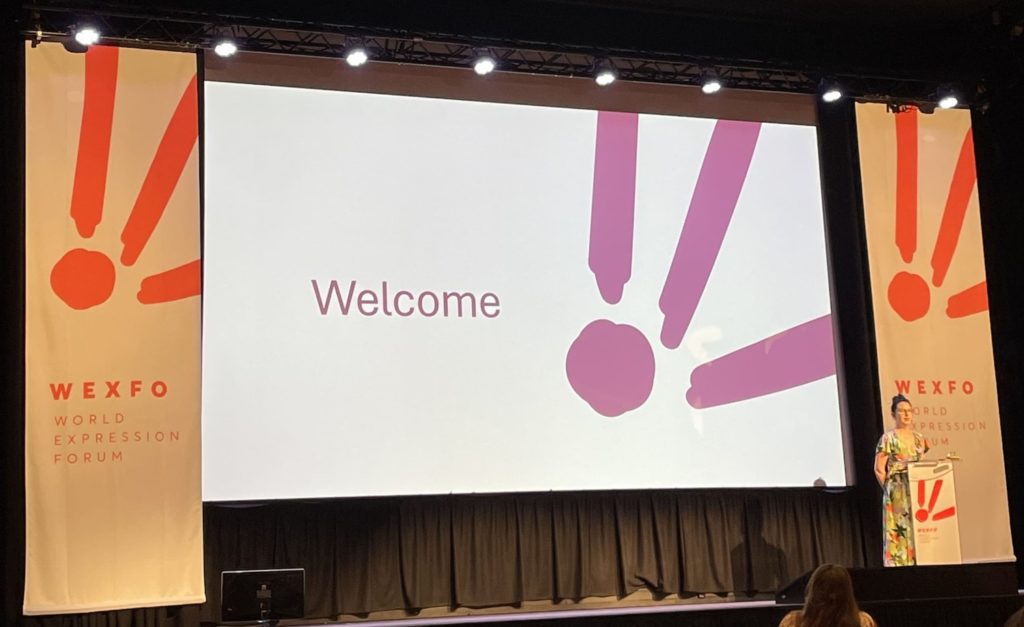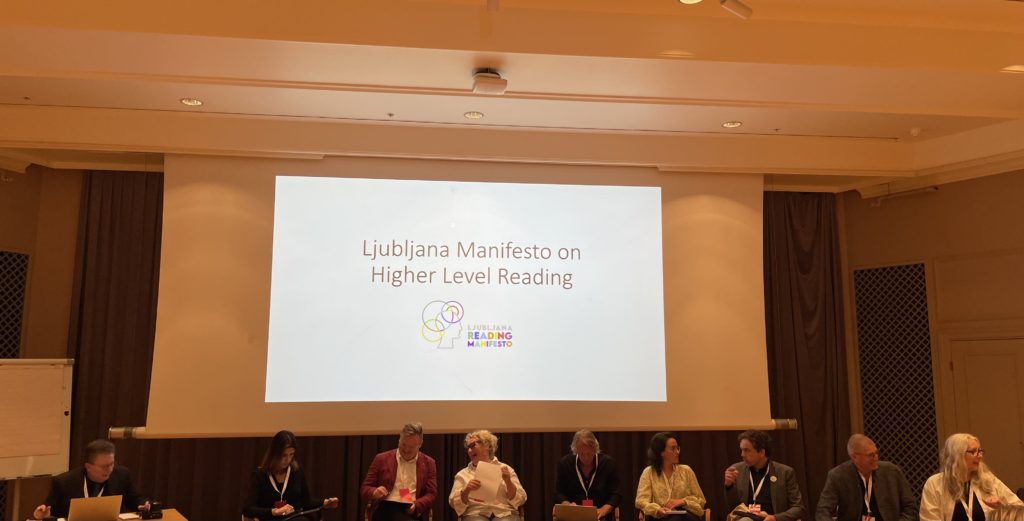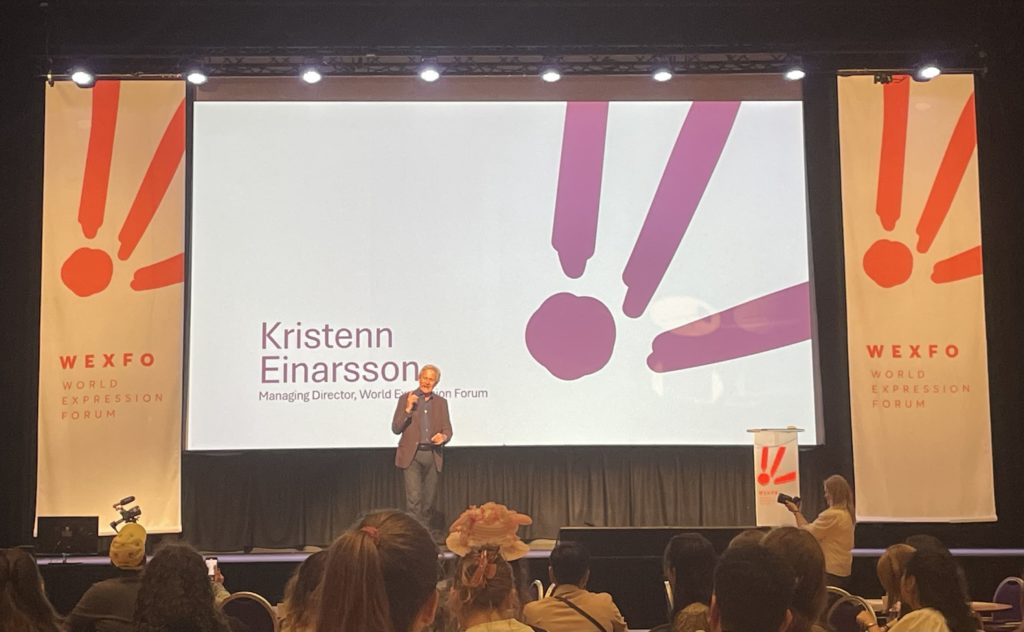On 27th and 28th of May 2024 the World Expression Forum (WEXFO) opened its doors for the third consecutive year in Lillehammer, Norway, seeking answers to the question of “How to Fight the Global Free Speech Recession?”. In the much talked about Election Year we are looking at a world that has more and more countries autocratizing while democracy and freedom of expression is being threatened continuously.

Simultaneously to WEXFO welcoming its participants to the first conference day, Verdens Gang, one of Norway’s biggest newspapers, published an opinion piece by Kristenn Einarsson, WEXFO’s managing director, titled: Democracy is built on reading skills (Demokratiet bygges på leseferdigheter). Accordingly, Einarsson, who is part of the Aldus Up Working Group on Reading, and his team made the significance of reading and the book sector for democracy development a crucial topic at WEXFO 2024.
In the following we recapture what has been talked about in the panels and presentations related to this topic, which is so closely connected to Lillehammer, a UNESCO city of literature and former home to two Nobel laureates in Literature.
Google’s first sin
The first day’s session Will AI be our censorship overlord or the defender of freedom of expression? was opened by Peter Schoppert, publisher, reformed technology entrepreneur and past president of the Singapore Book Publishers Association. In his spotlight speech AI and Piracy – the Copywrite Discussion he took the audience back to 2016, documenting Google’s development of their AI powered Large Language Models. For the initial training the company download around 11.000 freely available e-books without permission. While free to read doesn’t equal free to train, Google justified their move explaining it “doesn’t harm the authors” in one of their very few statements on this topic over the years. In a sea of publicly accessible content getting enough data isn’t a problem anymore – compared to the data sets that are used by Google nowadays 11.000 books are a pinch of salt. Filtering what’s useful is the real challenge. The solution? AI itself! Schoppert reminded the book industry to be mindful of the fact that the self-supporting capabilities of Google’s models therefore are deep down routed in books, which were once used for non-consensual training on the verge of piracy.
Breakout session on Reading
In Monday’s breakout session titled Access to Information, Books and Ideas – How to Advance the Freedom to Read? reading took center stage. A stacked panel of eight experts was led by Porter Anderson, who right at the top emphasized the importance for the book industry to connect and exchange ideas outside of bookfairs, e.g. on events such as WEXFO. The Editor-in-Chief of Publishing Perspectives also explained why WEXFO is a no brainer in particular by identifying the trinity of freedoms: The freedom to read, to express and to publish – clearly all aspects closely connected to the book industry.
The first panelist to speak was Laurie Halse Anderson, talking about the new wave of book bans in US schools. From July to December 2023 alone 4349 instances had been recorded. Anderson explained that the process of getting a title removed from the curriculum or the school library was once a complex one which assured a degree of reasonableness. In recent years, just as stories got more diverse and painted more realities, especially books about sexual violence and LGBTQ+ get targeted more and more. The author of Speak, a critically acclaimed book about sexual violence and consent, experienced first-hand what it means to get cancelled, having her book be subject of bannings in at least 66 school districts and going from visiting 70-80 schools a year to just one in 2023. Having in mind that school libraries often provide the only access to books, her plea is straightforward: “parents have the right to choose what their children read, but not decide for other children.”
Following that, president-elect Karine Pansa talked about the work of the International Publishers Association, which has two pillars: The promotion of copyright & the defense of the freedom to publish. As an umbrella organization for other associations and representing the interests of publishers, but also booksellers & libraries, she emphasized that issuing statements isn’t enough, but deeply believes in the need of alliances in order to additionally find concrete ways to strengthen the freedom to read.
Library manager at Volda University College, Norway, Mariann Schjeide then briefly touched on the importance of libraries for the promotion of reading. Speaking from her insight through the International Federation of Library Associations and Institutions (IFLA) information previously was mostly promoted through books while libraries have now shifted the focus to events. Relating to Laurie Halse Andersons talk, Schjeide pointed out that books definitely don’t get challenged the same way in Norway, but that there are some dynamics which lead to authors censoring themselves to increase their chances of getting into the market.
Self-censorship also got picked up by Tora Åsling, Policy Officer at the European and International Booksellers Federation (EIBF). With concerning laws in Hungary and France as well as protest in the UK, Ireland, Spain and France against bookshops and shopwindow displays, more and more booksellers also censor themselves in advance to avoid trouble. Therefore, more and more UK bookshops use toolkits/manuals developed to deescalate conflicts with customers. In Europe, Åsling added, it’s apparent that most books facing challenging reactions are non-heteronormative.
Jørgen Lorentzen (Norwegian Non-Fiction Writers and Translators Association, NFFO) recaptured a conversation he had with his son, questioning why we still need to read books in an age of instant information via our smartphones. Lorentzen brought forward four answers: To discover wonderful stories, to participate and say something in this world, to in return write, phantasies and imagine, and, last but not least, to build and defend democracies. He underlined this last aspect by stating autocrats “are ruling, not reading”. Turning to Even Aleksander Hagen (Ministry of Culture and Equality) in the audience Lorentzen bluntly stated that the national reading strategy isn’t enough anymore, but instead all stakeholders need to come together and demand 1 billion NOK (approx. 87 million EURO) by the government for this cause. In the end he emphasized the importance of supporting book industries abroad by giving two examples: Firstly, in the context of the recent Factor Druk bombing in Charkiw the support of Ukrainian books for the time after the war, to build and secure democracy, is vital. Secondly, the NFFOs collaborations in Malawi and Uganda to foster local publishing and independence from international publishers who’s books often times don’t fit diverse realities and cultural identities.
Miha Kovač (University of Ljubljana) recaptured the Ljubljana Reading Manifesto, which was presented at last year’s Frankfurt Book Fair and emphasized the importance of Higher Level Reading, meaning the “reading of long and complex texts about complex problems that require intellectual patience, force us to self-questioning, train us in perspective-taking and require understanding of rules of logic.” The impact, relevance and connectability of the manifesto could be once again felt at WEXFO where critical thinking skills and complex reading was mentioned several times by numerous speakers, such as Karine Pansa, Porter Anderson, Kimberly Wehle (University of Baltimore School of Law), Elisabeth Cassina Wolff (historian, University of Oslo), Olav Brostrup Müller (see below) and Bojan Marjanović (IDEA). Kovač highlighted the impact of technologies, which aren’t neutral but train different cognitive abilities. Screen technologies are closely connected to multitasking, fast changes of focus, skimming the surface of content, and navigating in a vast sea of information. On the other hand, books and long linear texts train to maintain focus on a single text, on one narrative and broaden and deepen the vocabulary through encountering more complex sentences than in speech.

The state secretary of Norway’s Ministry of Culture and Equality, Even Aleksander Hagen, then got into a bit more detail what surrounds the new national reading strategy (“Time to read”). Hagen stressed that it’s the governments duty to protect its citizens right to imagine, express and read. Norway’s reading and literature policies involve supporting the infrastructure and financing for libraries, ensuring fair competition conditions in the book industry and fostering the competence and joy of reading. News broke after WEXFO that for the new reading strategy the government allocates 300 million NOK (approx. 26 million EURO). Besides political measures, adults have a huge responsibility as role models in getting children excited to read: “Children don’t do what we tell them to do, but what we do”, Hagen put it.
Olav Brostrup Müller (head of culture Lillehammer) was the last to take stage and gave a quick insight into Leseløft Lillehammer, the town’s own reading strategy independent from the national one. With its overarching theme of literacy, it is based on the recommendations made by the Ljubljana Reading Manifesto and focusses on the three educational periods of children and young people: the transition from kindergarten to school, middle school and secondary school. To promote reading various Lillehammer institutions and programs collaborate with each other, including schools, the public library, the literature festival (which took place parallel to WEXFO) and Pegasus, its program for children and young people, WEXFO, the municipality, the UNESCO literature city and the culture school bag. Overall it’s anchored in the municipality’s recently adopted cultural plan for 2024-35, where the goal of an enlightened community is emphasized.
The presentations were followed by an audience question which led to the panel discussing the question “What is a book?”. There was some obvious disagreement whether listening to an audiobook should be considered as a form of reading a book. Mariann Schjeide argued in favor of promoting audiobooks not just as some kind of second tier book. In her opinion audiobooks are a legitimate way into literature for children and a great alternative for adult readers, stating “audiobooks are heard to by readers”. Disagreement was put forward by Miha Kovač, who said he’d be ten times cautious in not differentiating between the modes of reading and listening as they require and train different cognitive abilities.
The breakout session was concluded by Kristenn Einarsson who stressed that now is the time to act on the talks as we archived a common understanding that reading needs to be promoted to strengthen democracy. Ideally an EU-level project brings academic research, reading promotion, schools and book industry institutions to one table in order to gather all the best (local) reading promotion practices.
Burning books
The second day of WEXFO started off by asking Burning religious symbols – expression or vandalism? In 2023 multiple incidents of Quran burnings and subsequent demonstrations took place in Sweden and Denmark which challenged the realms of freedom of expression and hate speech. Anine Kierulf, associate professor of constitutional law at the University of Oslo and special advisor to the Norwegian Human Rights Institution, set the scene by explaining the different facets of the legal framework that decide in which context book burnings are legal or illegal. She stated freedom of expression is only possible without censorship by the government and without violence by fellow citizens.
Next Gérard Biard, editor-in-chief at Charlie Hebdo, reflected on the state of censorship and freedom of speech with regards to journalism and satire. For him satirical cartoons are still a powerful tool to fight power, to shock and to criticize as images, dating back to the French revolution, are easily understood by everyone. While faith and the relationship to God is everyone’s personal business, religion is the social and political organization of faith, an idea which has to be challenged like any other idea, Biard said. 9 years after the tragic 2015 attack on Charlie Hebdo’s headquarter the editor-in-chief notes that the totally independent, advertisement free newspaper has less and less readers. To “make new readers” he sees the need to explain to young people who they are and what they do.
In a closing panel Anine Kierulf, Anders Lindberg (Political editor-in-chief at Aftonbladet) and Ahmed Samih Farag (human rights activist, journalist, and TV presenter) discussed if Quran burnings should be allowed as a form of freedom of expression. Farag emphasized the dangers such a political act can trigger if it’s not clearly illegal: On the one hand it is an empowering signal to other anti-Islamic extremists (also across borders), on the other hand it can in return also lead to violence against non-Muslims in Islamic countries. While he stated no positive effects can be gained for society through the burning of religious symbols and it should therefore not be covered by freedom of expression, Kierulf underlined that there are laws in place covering hate speech but watering them down to protect feelings can backfire dramatically. Lindberg concluded that context matters to judge if burning a Quran is a hate crime or not, even if it can be clearly acknowledged as a way of publicly dehumanizing Muslims and preventing them from participating in society.
WEXFO Youth
After Monday’s and Tuesday’s WEXFO youth voices, where 1000 youngsters already participated in events organized by themselves, WEXFO Youth Network Conference took place on Wednesday. Here WEXFO brought together organizations, stakeholders and voices from around the world to promote young people’s participation in society, because just like Ewura Adams Karim (Co-founder & Executive Director Maltiti foundation) put it: “We are not just the future but the present.” As one of the first to the stage he described how the discovery of writing and poetry enabled him to put into words how he felt, breakout of his introverted shell and become more self-confident. From there his life as an artist began and he, among other activities, started to organize transformative theater plays which have long lasting effects, e.g. empowering women and fostering collaborations in the community.
Judith Hoffmann (German Publishers and Booksellers Association) presented numerous programs and activities of the Börsenverein. Reading promotion has been a core motivation for the Association since its foundation in 1825 as it’s one of the most clear-cut ways to raise book sales – a win-win situation. Their program e.g. includes the yearly national reading competition from 6th grade onwards as well as the international pendant for German children abroad. To strengthen the role and perspectives of young people in the German publishing industry the Börsenverein annually organizes the Future Parliament: In this two-day workshop career starters have the chance to talk and learn about current topics, trends and developments in publishing as well as network with fellow young professionals. Their ideas on which actions must be taken then get presented to the Association at the annual general meeting. The Börsenverein also awards three of the most prestigious prizes in German book trade: The internationally acclaimed Peace Prize, the German Book Prize and the German Non-Fiction Prize. In close topical relation to WEXFO the Association in 2021 initiated the annual Freedom of Expression Week from 3rd to 10th of May – symbolically beginning with the World Press Freedom Day and closing the day commemorating the 1933 book burnings in Germany.
After three intense and inspiring days Kristenn Einarsson concluded the conference by stating it has been the “best WEXFO so far”. See you next year, June 2nd & 3rd!

Note: This article is based on notes taken at WEXFO. If you feel like any mishearings made their way into the article feel free to contact me: bleserle@uni-mainz.de
 By
By 

















